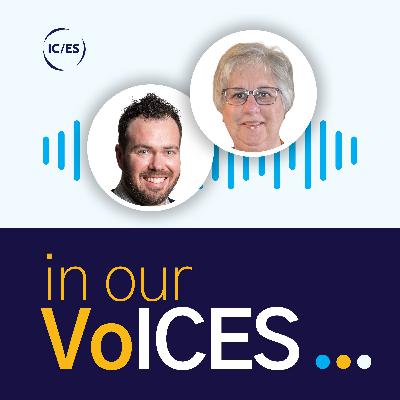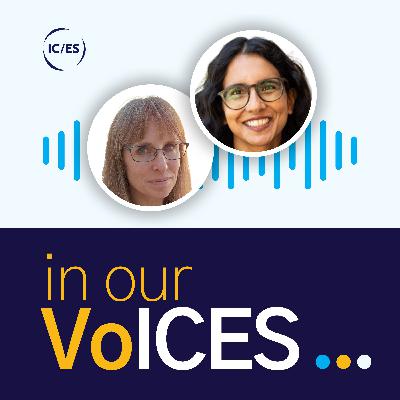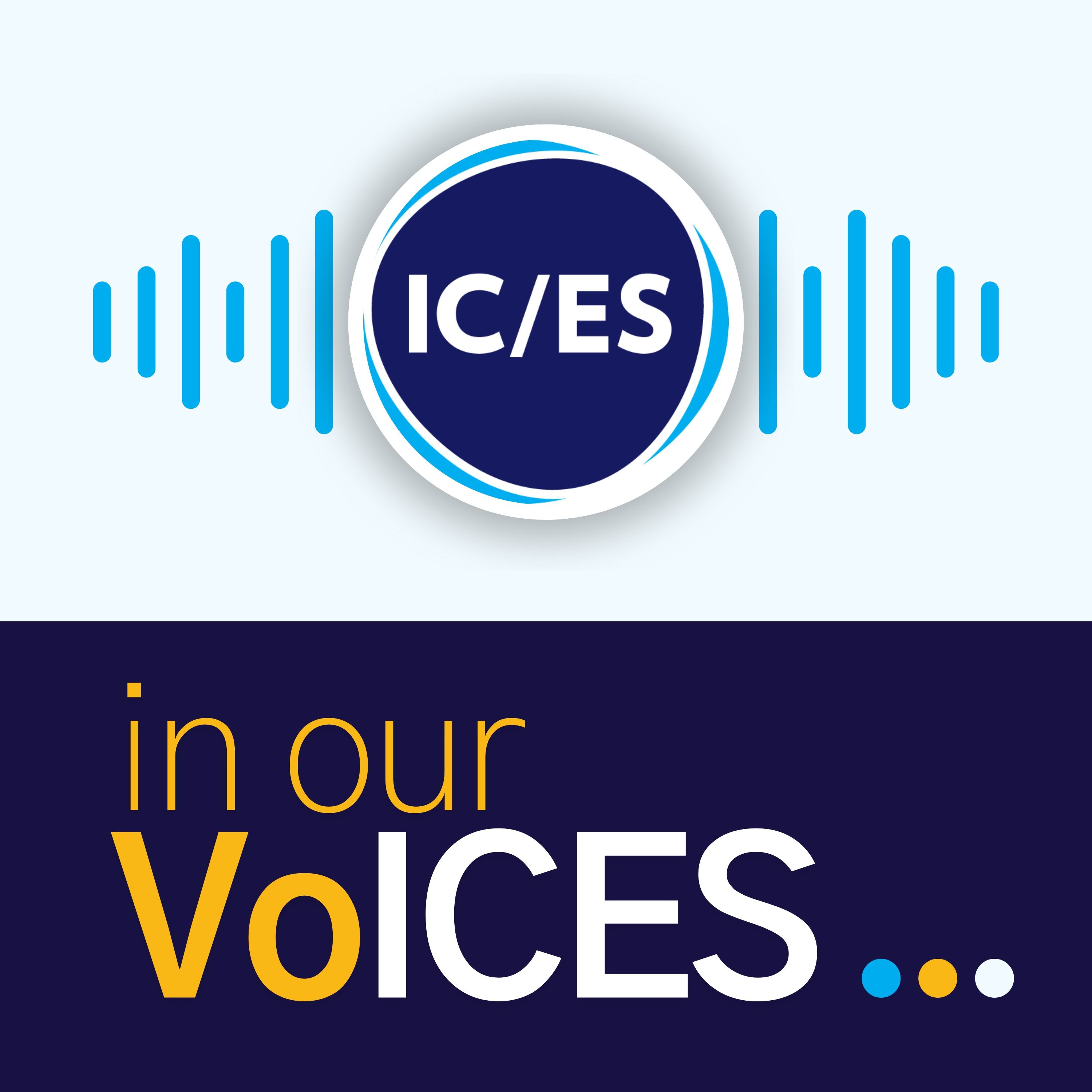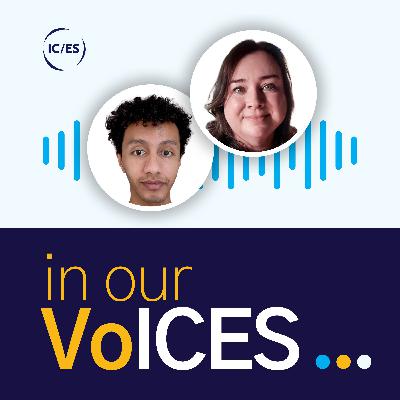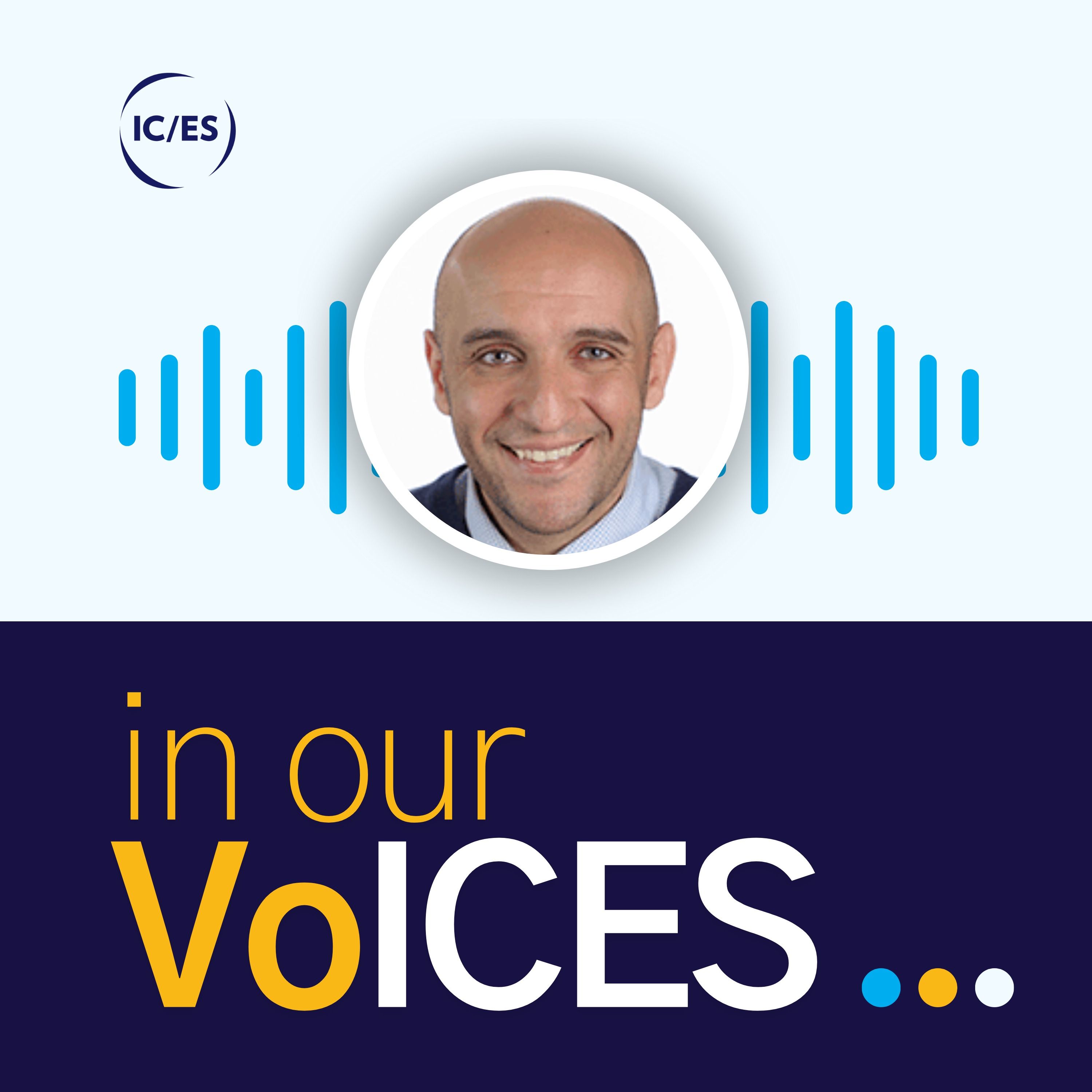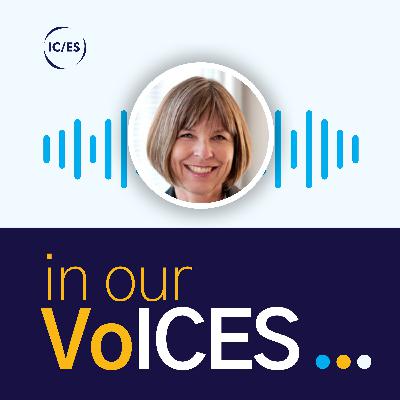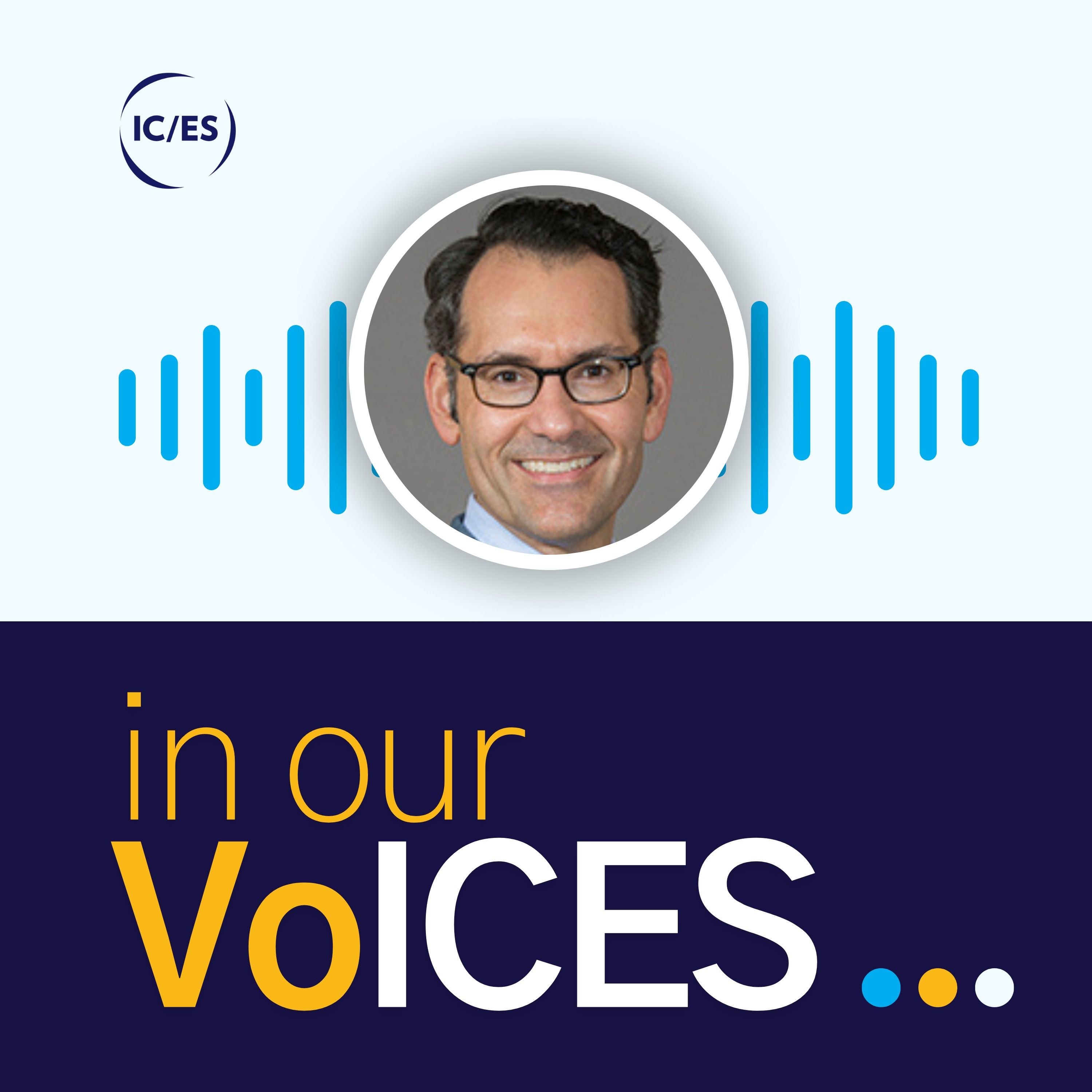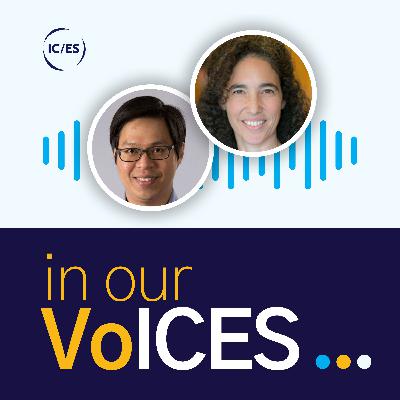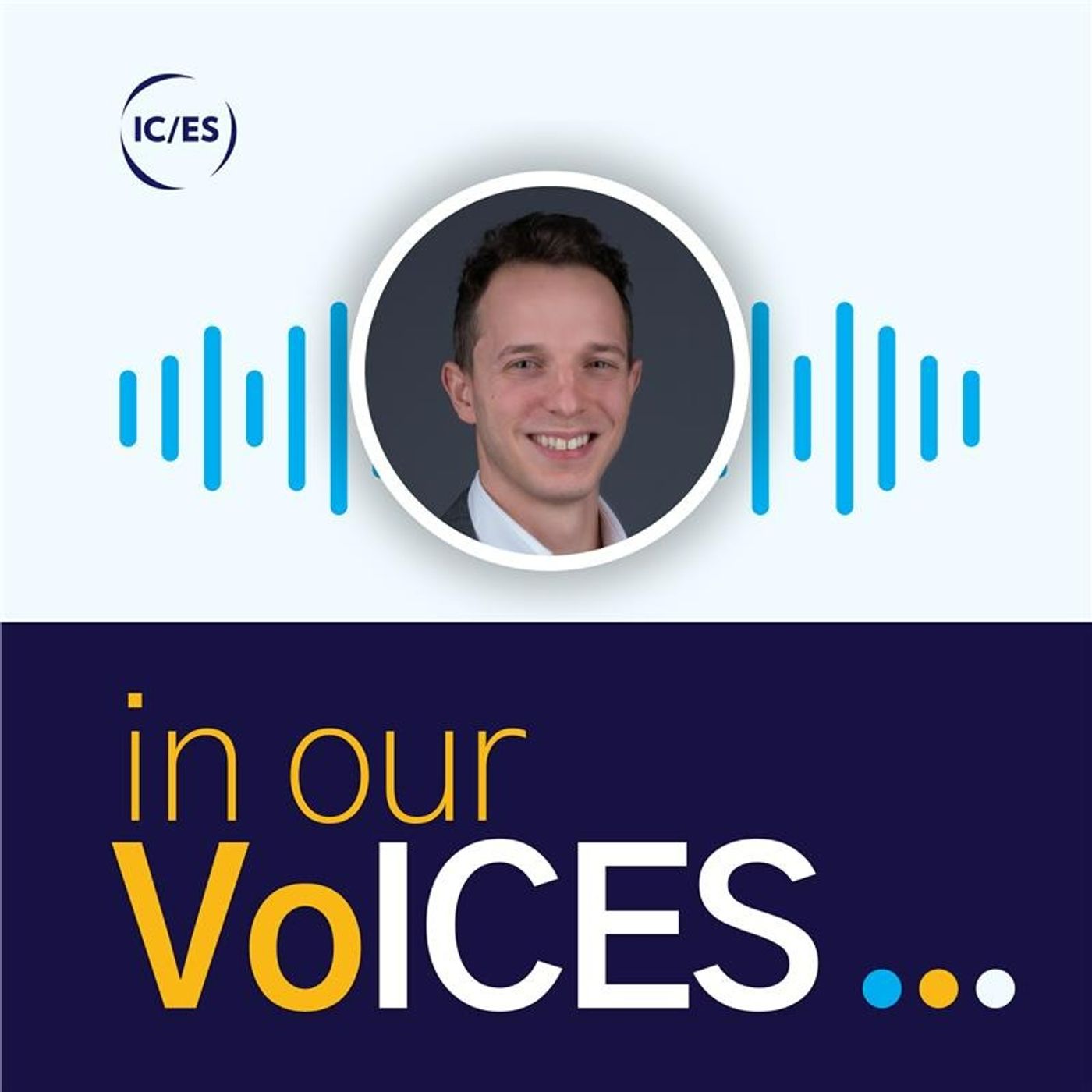Discover In Our VoICES
In Our VoICES

12 Episodes
Reverse
What does affirming, respectful, and safe health care look like for transgender and gender diverse individuals- and why does it matter now more than ever? In this episode, we discuss the importance of gender-affirming care and how we can make health care safer and more inclusive for transgender and gender diverse individuals. Dr. June Lam, MD, PhD, FRCPC is an Associate Scientist with the Institute for Mental Health Policy Research at the Centre for Addiction and Mental Health (CAMH) and an Assistant Professor in the Department of Psychiatry at the University of Toronto. He is also a psychiatrist working in the CAMH emergency department and the Gender Identity Clinic. He completed a Bachelor of Science Honours Pharmacology program at UBC, his medical training at McGill University, and his psychiatry residency at the University of Toronto. He also completed a transitional age youth and transgender health research and clinical fellowship, as well as a PhD program in Clinical Epidemiology and Health Care Research (at the Institute of Health Policy, Management and Evaluation or IHPME) at the University of Toronto. Dr. Lam's academic and clinical focus is on care for 2SLGBTQIA+ communities, particularly using health services research to examine and improve access to mental healthcare for transgender and gender diverse (TGD) people. He has developed expertise in mixed methods research, uniquely integrating health administrative data and qualitative research to leverage the strengths of participant lived experience and population-level data. Dr. Victoria “Tori” Anderson (she/her) is a resident physician, educator, and advocate passionate about creating inclusive, affirming mental health care for gender diverse youth and their caregivers. She is a senior resident in the Child and Adolescent Psychiatry subspecialty program at the University of Toronto. She completed her general psychiatry training at the University of Toronto, where she was recognized with a departmental award for her achievements in scholarship in the areas of sexual and gender diversity in mental health care. ICES research you heard aboutICES | From crisis to silence: systemic failures in mental healthcare for transgender and gender diverse people in OntarioICES | Characteristics of transgender individuals with emergency department visits and hospitalizations for mental healthICES | Exploring mediators of mental health service use among transgender individuals in Ontario, CanadaICES | Physician follow-up among transgender and gender diverse individuals after psychiatric emergency department visits and hospitalizations: a retrospective population-based cohort study
EPISODE CREDITS:Produced, edited and mixed by Will Mcintyre, Richard Villeneuve and Pop Up PodcastingArtwork designed by Stella-Luna HaMusic licensed through Melodie MusicLINKS:Be sure to follow and tag ICES on Bluesky, X, Instagram and LinkedIn. To find out more about our organization, visit us at ices.on.ca
How is GEMINI using AI to turn routine hospital records into tools for national healthcare reform? In this episode we discuss how AI and health data can be harnessed to improve healthcare and how we ensure these tools are used responsibly. Amol Verma is a physician and scientist in General Internal Medicine at St. Michael’s Hospital and the Temerty Professor of AI Research and Education in Medicine at the University of Toronto. He is a health services researcher, studying and improving hospital care using electronic clinical data. Dr. Verma co-founded and co-leads GEMINI, Canada’s largest hospital clinical data research network, which is collecting data from >35 hospitals in Ontario. He also co-founded and co-leads VITAL, a multi-provincial clinical data platform. Dr. Verma completed medical training at the University of Toronto, a Masters degree at the University of Oxford as a Rhodes Scholar, and research fellowships through the Royal College of Physicians and Surgeons of Canada, the Canadian Frailty Network, and AMS Healthcare. He served on the Council of Canadian Academies Expert Panel on Health Data Sharing, is a Provincial Clinical Lead for Quality Improvement in General Internal Medicine with Ontario Health, and is the Chair of the Researcher Council and a Board Member of the Digital Research Alliance of Canada and AMS Healthcare. He received the 2022 Royal College of Physicians and Surgeons of Canada Early Career Leadership Award, the 2022 Canadian Institutes of Health Research’s early career Trailblazer Award in Population and Public Health Research, and the 2023 Canadian Society of Internal Medicine’s New Investigator Award.Nicole Yada is the Director of the VITAL Platform at GEMINI. Prior to joining the GEMINI team, Nicole was the inaugural Program Director for the Accelerating Clinical Trials Consortium and oversaw business development for ICES. She holds a master's degree in health informatics from McMaster University and is completing her PhD in Health Services Research at the University of Toronto. Ms. Yada trained as a graphic designer in Tokyo, Japan and has a background in marketing and research journalism. Research you heard aboutCharacterizing medical patients with delirium: A cohort study comparing ICD-10 codes and a validated chart review method - PubMedLearn more about GEMINIICES | New data partnership to expand insights on hospital care in Ontariohttps://geminimedicine.ca/
EPISODE CREDITS:Produced, edited and mixed by Will Mcintyre, Richard Villeneuve and Pop Up PodcastingArtwork designed by Stella-Luna HaMusic licensed through Melodie MusicLINKS:Be sure to follow and tag ICES on Bluesky, X, Instagram and LinkedIn. To find out more about our organization, visit us at ices.on.ca
Does assisted living adequately balance older adults’ need for independence and regulated medical care? In this episode we shed light on assisted living—its benefits, shortfalls, and why so many Canadians prefer to age in place. Dr. Derek Manis is an interdisciplinary health services and policy researcher and epidemiologist who has expertise in population-level analytics, observational and quasi-experimental study designs, causal inference, and mixed methods. He primarily uses health system administrative data that are linked at the level of the individual to examine health care quality, models of care, and health outcomes among older adults with an emphasis on older adults in residential care facilities (e.g., nursing homes, assisted living facilities, etc.) Dilys Haughton is an advocate for patient centered care and has experience caring for a family member in assisted living. She is a retired Primary Care Nurse Practitioner and healthcare executive who has practiced clinically in primary care practices, long-term care homes, and hospital settings. With a lifelong passion for care of the elderly, she was instrumental in demonstrating the effectiveness of the Nurse Practitioner role in the first wave of Primary Care Team models in Paris, Ontario (late 90's) and implementing a model of care for the elderly in a network of long-term care homes in Hamilton, Ontario. As a health executive, Dilys has led system collaboration and improvement initiatives, and championed research in long-term care and home care. ICES research you heard aboutICES | Do assisted living facilities that offer a dementia care program differ from those that do not? A population-level cross-sectional study in Ontario, CanadaICES | Association between dementia care programs in assisted living facilities and transitions to nursing homes in Ontario, Canada: a population-based cohort studyICES | Transitions to nursing homes among residents of assisted living and community-dwelling home care recipientsICES | Clinical comorbidities and transitions between care settings among residents of assisted living facilities: a repeated cross-sectional studyICES | Clinical and sociodemographic characteristics of new residents of assisted living: a nested case-control studyICES | Addressing long-term care's "dark matter"ICES | Rates of hospital-based care among older adults in the community and residential care facilities: a repeated cross-sectional studyMeeting the needs of older adults in residential care settings
EPISODE CREDITS:Produced, edited and mixed by Will Mcintyre, Richard Villeneuve and Pop Up PodcastingArtwork designed by Stella-Luna HaMusic licensed through Melodie MusicLINKS:Be sure to follow and tag ICES on Bluesky, X, Instagram and LinkedIn. To find out more about our organization, visit us at ices.on.ca
Does the answer to improving the primary care system lie in the ideas of patients and the public? In this episode we discuss Canada’s primary care crisis and how the OurCare project is involving the public in reimagining primary care. A family doctor and renowned primary care researcher, Tara Kiran investigates how changes in the health care system impact patients, particularly the most vulnerable. In her research and practice, she develops and tests solutions to make health care more inclusive and more effective. Much of Tara’s research has evaluated how primary care reforms have impacted quality of care. She also leads research to directly improve quality of care including initiatives to measure and reduce care disparities, engage patients in health service improvement, and support physicians to learn from data. In 2022, Tara launched OurCare—a national initiative that engaged nearly 10,000 people across Canada over 16 months to co-create a blueprint for a stronger and more equitable primary care system. She is also the creator and host of Primary Focus, a new podcast that shares stories and innovations from Canada and around the world to inspire a stronger primary care system. Tara holds the Fidani Chair of Improvement and Innovation at the University of Toronto. She practices family medicine at St. Michael’s Hospital, Unity Health Toronto where she is also a Scientist at the MAP Centre for Urban Health Solutions. She is the Vice Chair for Quality and Innovation in the Department of Family and Community Medicine at the University of Toronto, a Senior Adjunct Scientist at ICES and an Associate Professor in the Faculty of Medicine and the Institute of Health Policy, Management and Evaluation at the University of Toronto. You can learn more about her research at https://maphealth.ca/kiran/ Sandy Epp is a Patient Engagement Advisor in Manitoba and Project Analyst (Quality Assurance) in the healthcare space. Sandy is also a mother of two young adults and the daughter of two aging parents. Over the past 5 years she has been tasked with helping her loved ones find care for a host of serious issues relating to mental and physical health, and found the struggle to get them timely and adequate care nearly overwhelming. Sandy decided to become a Patient Advisor to provide her loved ones with a voice in the care they received, in the hopes that changes could be made to our healthcare system for all Manitobans. The first phase of OurCare launched in the Fall of 2022 with a survey of 9000 people. The second phase included priority panels with ~35 members of the public in five provinces. They gathered to learn about primary care and deliberated with each other about shared values that should underlie the system, important issues, and recommendations. Participants wrote their own reports and presented these to key stakeholders. The third phase included 10 community round tables, two in each of five provinces, in partnership with community organizations who had established relationships with members of marginalized communities—for example, members of Indigenous communities, Black communities, newcomer groups, the LGBTQ+ community, and people with disabilities. To find out more, visit: https://www.ourcare.ca/ ICES research you heard about: https://www.ices.on.ca/publications/journal-articles/family-physicians-in-focused-practice-in-ontario-canada/
EPISODE CREDITS:Produced, edited and mixed by Will Mcintyre, Richard Villeneuve and Pop Up PodcastingArtwork designed by Stella-Luna HaMusic licensed through Melodie MusicLINKS:Be sure to follow and tag ICES on Bluesky, X, Instagram and LinkedIn. To find out more about our organization, visit us at ices.on.ca
Tune in September 10 for season two of In Our VoICES, the podcast that brings you the health data, without the drama. This season, we’re diving into all new topics with trusted experts, scientists, and we’ve invited extra special guests to give voice to the public and patients—because behind every number is a story, and that story matters. Make sure to follow us on your favourite podcast app so that you don’t miss an episode and learn more by visiting our website at ices.on.ca!
EPISODE CREDITS:Produced, edited and mixed by Will Mcintyre, Richard Villeneuve and Pop Up PodcastingArtwork designed by Stella-Luna HaMusic licensed through Melodie MusicLINKS:Be sure to follow and tag ICES on Bluesky, X, Instagram and LinkedIn. To find out more about our organization, visit us at ices.on.ca
Why should healthcare research be done “by us” and not just “for us”? Guest host Laura Ferreira-Legere chats with ICES Public Advisory members Jenny Kirk and Jemal Demeke about why lived experience matters and how communities can shape better research. Welcome to our guest host, Laura Ferreira-Legere! Laura is Senior Manager of the Public and Community Engagement, Knowledge Translation team at ICES and works closely with the ICES Public Advisory Council.Joining Laura are two members of ICES’ Public Advisory Council (also known as the PAC). The PAC was formed in 2019 and is made up of a rotating group of members from across Ontario who guide ICES on what matters most for health data research.Jenny Kirk was a PAC member on our second cohort, from 2021-2024. Jemal Demeke is a current PAC member who joined the group in 2022 as part of our third cohort. How did the PAC get involved in research?Early in the PAC’s formation, they identified their participation in health research as a priority. The Applied Health Research Question (AHRQ) program at ICES acted as a mechanism to begin this work, which allows community groups (called “knowledge users”) to access ICES data and analytics to help answer important research questions. The PAC decided to explore mental health service use in Ontario, including understanding the reasons for visits to doctors or Emergency Departments, how service use may vary over time, and most importantly, how social factors like income and housing situation impact where people seek care.Learn more about the PAC: ICES | Our Organization | Public Advisory CouncilLearn more about the research project: ICES | Mental health-related visits to doctors and emergency departments in Ontario: a public-led exploration and analysis Read more about patient and public involvement in research:Evaluating patient and public involvement in researchMapping the impact of patient and public involvement on health and social care research: a systematic reviewPatient engagement in care: A scoping review of recently validated tools assessing patients' and healthcare professionals' preferences and experience
EPISODE CREDITS:Produced, edited and mixed by Will Mcintyre, Richard Villeneuve and Pop Up PodcastingArtwork designed by Stella-Luna HaMusic licensed through Melodie MusicLINKS:Be sure to follow and tag ICES on Bluesky, X, Instagram and LinkedIn. To find out more about our organization, visit us at ices.on.ca
Can your local pharmacist help fix the primary care crisis? Dr. Mina Tadrous, host of I’m Pharmacy, joins us to explore the data behind expanded pharmacy services in Ontario — and what this shift means for the future of healthcare. A note that this episode was recorded during the Ontario provincial election. We also make mention of a few acronyms:UTI: Urinary tract infectionPPIs: Proton pump inhibitors are a class of medications that reduce stomach acid.ODPRN: Ontario Drug Policy Research NetworkInspire-PHC: Inspire – Primary Health Care supports Ontario researchers with all aspects of their projects related to primary care.Our Guest:Mina is an assistant professor at the Leslie Dan Faculty of Pharmacy at the University of Toronto and the Tier 2 Canada Research Chair in Pharmaceutical Policy and Real-world Evidence. He is also co-director of Pharmaceutical Policy and Pharmacy Practice at the Ontario Drug Policy Research Network (ODPRN) and ICES adjunct scientist. Mina leads research focused on evaluating drug policies and post-marketing surveillance of medications. He works closely with policymakers and uses large data sets to answer questions about real-world safety and effectiveness and improving the optimal use of medications.Check out Mina’s podcast:https://www.pharmacy.utoronto.ca/about/im-pharmacy-podcast-season-fourRead the Research:Impact of the COVID-19 Controlled Drugs and Substances Act exemption on pharmacist prescribing of opioids, benzodiazepines and stimulants in Ontario: a cross-sectional time-series analysisApplied Health Research Question (AHRQ) Project (in progress): Evaluating pharmacist scope of practice expansion
EPISODE CREDITS:Produced, edited and mixed by Will Mcintyre, Richard Villeneuve and Pop Up PodcastingArtwork designed by Stella-Luna HaMusic licensed through Melodie MusicLINKS:Be sure to follow and tag ICES on Bluesky, X, Instagram and LinkedIn. To find out more about our organization, visit us at ices.on.ca
Do older women feel seen and heard in healthcare? We explore how the Women’s Age Lab is tackling gender gaps in aging — from medication overload to social isolation — and pushing for change. Our Guest: Dr. Paula Rochon is the Founding Director of Women’s Age Lab, at Women’s College Hospital, Professor in the Department of Medicine and Institute of Health Policy, Management and Evaluation, and RTOERO Chair in Geriatric Medicine at the University of Toronto. Her career is focused on promoting the health and well-being of older adults, particularly women, and finding new ways to improve their lives. She has published over 300 papers in peer-reviewed journals, is Chair of the Canadian Institutes of Health Research Institute of Aging Advisory Board, Deputy Editor of the Journal of the American Geriatric Society and was awarded the Eugenie Stuart Award for Best Thesis Supervisor from the University of Toronto, Institute of Health Policy, Management and Evaluation. She founded Women's Age Lab, the first and only research centre of its kind, to focus on improving the health and well-being of older women. Through decades of experience and leadership, Dr. Rochon is creating a space for collaboration on science-driven health and social change that will improve the lives of older adults, specifically women.Read the research from Dr. Rochon:Women’s Age LabThe impact of age, sex, and gender on polypharmacy and potential prescribing cascades: lessons from five databasesSex-based trajectories of health system use in lonely and not lonely older people: a population-based cohort studyThe impact of sex and gender on prescribing cascades in older adults
EPISODE CREDITS:Produced, edited and mixed by Will Mcintyre, Richard Villeneuve and Pop Up PodcastingArtwork designed by Stella-Luna HaMusic licensed through Melodie MusicLINKS:Be sure to follow and tag ICES on Bluesky, X, Instagram and LinkedIn. To find out more about our organization, visit us at ices.on.ca
Is data the cure for Canada’s mental health crisis? In this episode, we pull back the curtain on systemic failures and explore how combining data with lived experience could finally drive real change. Join us as we unpack what it will take to truly transform the system. Our Guest:Dr. Paul Kurdyak joined ICES in April 2009 where he leads the Mental Health and Addictions research program. He is a senior scientist with the Institute of Mental Health Policy Research at the Centre for Addiction and Mental Health (CAMH) and Chair, Addictions and Mental Health Policy at CAMH and the Institute of Health Policy, Management and Evaluation at the University of Toronto. Since 2020, he has held the role of Vice President, Clinical, with the Mental Health and Addictions Centre of Excellence at Ontario Health.Dr. Kurdyak studies clinical epidemiology and health service utilization. His work provides better understanding for the determinants of and barriers to treatment for mental illnesses; explores the relationship and interaction between chronic medical and mental illnesses; and develops methodology expertise in observational research design as it relates to the study of mental health epidemiology.Read the research from Dr. Kurdyak: Mental Health DashboardPayment incentives for community-based psychiatric care in Ontario, CanadaDisparities in access to early psychosis intervention services
EPISODE CREDITS:Produced, edited and mixed by Will Mcintyre, Richard Villeneuve and Pop Up PodcastingArtwork designed by Stella-Luna HaMusic licensed through Melodie MusicLINKS:Be sure to follow and tag ICES on Bluesky, X, Instagram and LinkedIn. To find out more about our organization, visit us at ices.on.ca
From diagnosis to dignity: Join us as we explore how autism research is shifting focus — centering the real-life experiences of autistic people, breaking down barriers in healthcare, and building a future rooted in empathy, inclusion, and understanding. Dr. Yona Lunsky is an adjunct scientist at ICES and Scientific Director of the Azrieli Adult Neurodevelopmental Centre and Director of the Health Care Access Research and Developmental Disabilities Program (H-CARDD) at the Centre for Addiction and Mental Health (CAMH). Dr. Lunsky has focused her research on the mental health needs of individuals with intellectual and developmental disabilities, and their families. She studies psychosocial risk factors for psychiatric disorders and health service utilization patterns in this population.Dr. Meng-Chuan Lai is a senior scientist and staff psychiatrist at CAMH. He is also an associate professor and co-chair of the Advisory Council for Equity, Diversity, Inclusion, Indigeneity and Accessibility in Clinical Care in the Department of Psychiatry at the University of Toronto. Dr. Lai’s research focuses on understanding and improving the mental health and wellbeing of autistic and other neurodivergent individuals, across sexes and genders, as well as their families. His research particularly concerns the experiences of female and gender-diverse autistic people and the relations between neurodivergence, sex differentiation, gender socialization, and mental health.Read the research from Dr. Yona Lunsky and Dr. Meng-Chuan Lai: Hospital use among autistic adults in CanadaSelf-harm events and suicide deaths among autistic individuals in Ontario, CanadaAzrieli Adult Neurodevelopmental Centre at CAMH Resources: Autistic SPACE: a novel framework for meeting the needs of autistic people in healthcare settings | British Journal of Hospital Medicine CAMH Resources: Autism and Mental Health
EPISODE CREDITS:Produced, edited and mixed by Will Mcintyre, Richard Villeneuve and Pop Up PodcastingArtwork designed by Stella-Luna HaMusic licensed through Melodie MusicLINKS:Be sure to follow and tag ICES on Bluesky, X, Instagram and LinkedIn. To find out more about our organization, visit us at ices.on.ca
What are the "highs" and "lows" of cannabis legalization in Canada? From rising cases of psychosis and a puzzling vomiting syndrome to the struggle of spreading accurate public health messages, we unpack the real-world health effects of legalization — made in Canada. Please note, this podcast was recorded before the holidays, which is why we refer to holiday dinners in one of our questions.Our guest:Dr. Daniel Myran is a public health and family medicine physician and researcher. He holds the Canada Research Chair in Social Accountability at the University of Ottawa, and is an ICES Adjunct Scientist, Investigator at the Bruyère Health Research Institute, and a Clinician Investigator at The Ottawa Hospital. His program of research involves using health administrative data to examine the burden and societal impact of mental health conditions and substance use. Dr. Myran’s primary focus is examining the health impacts of changes in alcohol/cannabis and drug policies and their influence on health inequities. As a secondary area of interest, he uses big data to examine the health of physicians and their practice patterns.Read the research from Dr. Myran:Read the Op‐Ed: There are good reasons to be anxious about growing cannabis use in Canada - The Globe and Mail1. Transition to schizophrenia spectrum disorder following emergency department visits due to substance use with or without psychosis2. Emergency department visits involving hallucinogen use and risk of schizophrenia spectrum disorder3. Association between non-medical cannabis legalization and emergency department visits for cannabis-induced psychosis4. Changes in emergency department visits for cannabis hyperemesis syndrome following recreational cannabis legalization and subsequent commercialization in Ontario, Canada5. Unintentional pediatric poisonings before and during the COVID-19 pandemic: a population-based study
EPISODE CREDITS:Produced, edited and mixed by Will Mcintyre, Richard Villeneuve and Pop Up PodcastingArtwork designed by Stella-Luna HaMusic licensed through Melodie MusicLINKS:Be sure to follow and tag ICES on Bluesky, X, Instagram and LinkedIn. To find out more about our organization, visit us at ices.on.ca
Want to understand more about data, health research, and analytics? We've got you covered in this pilot season of In Our VoICES. Follow the show on your favourite podcast app so that you don't miss an episode!
EPISODE CREDITS:Produced, edited and mixed by Will Mcintyre, Richard Villeneuve and Pop Up PodcastingArtwork designed by Stella-Luna HaMusic licensed through Melodie MusicLINKS:Be sure to follow and tag ICES on Bluesky, X, Instagram and LinkedIn. To find out more about our organization, visit us at ices.on.ca




